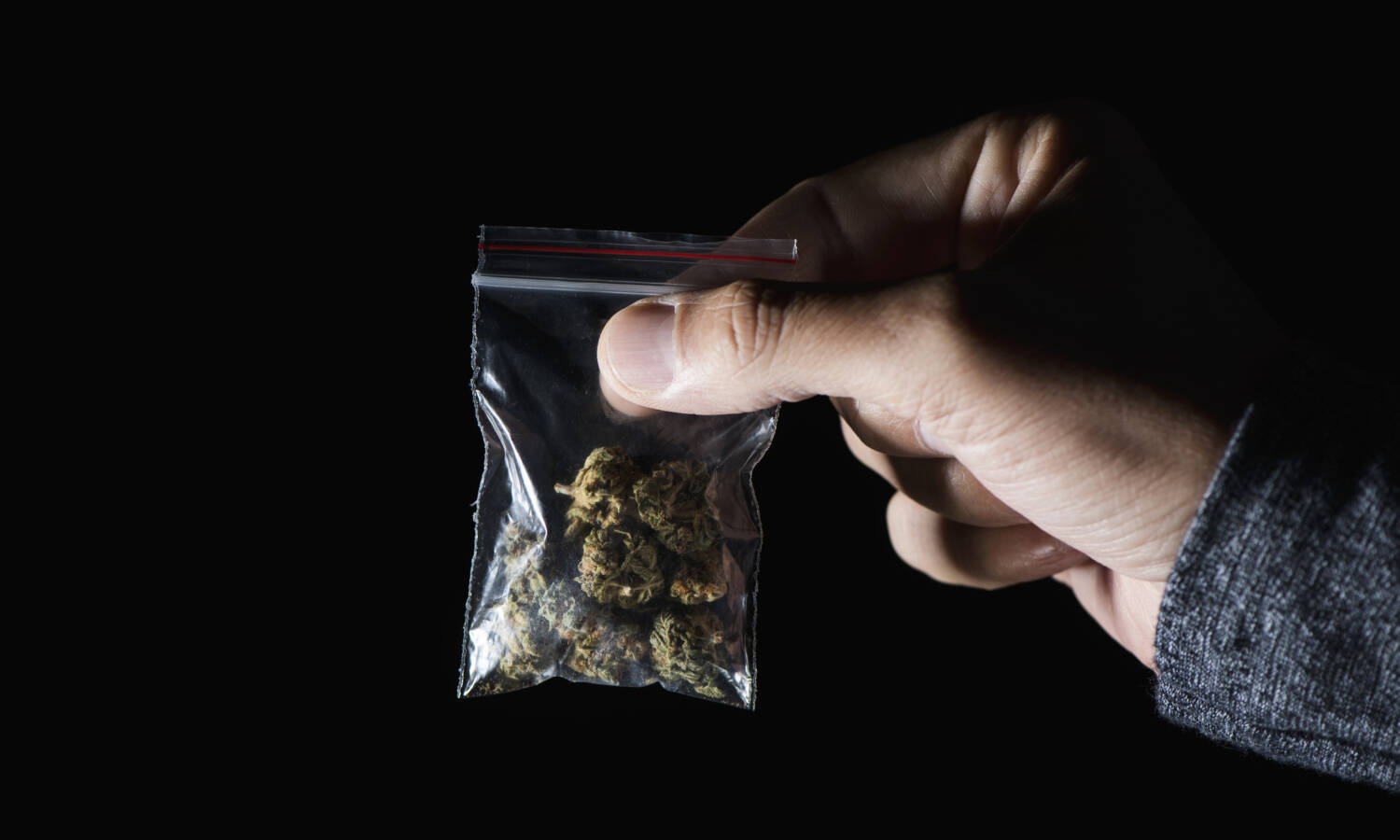Business
Report: Marylanders Will Consume A Lot Of Weed

Maryland borders a legal state, so this gives the local industry an opportunity to gain back market share by allowing consumers to buy closer to home.
Over 65% of Marylanders chose to legalize recreational cannabis in the November midterms. Starting in July, adults over 21 will be allowed to legally possess up to an ounce-and-a-half of marijuana and 10 grams of cannabis concentrates.
Lawmakers are now expected to set up a regulatory framework for the new and emerging market, as the state General Assembly is scheduled to return to Annapolis for its 90-day session later this week.
To that end, researchers at Cannabis Public Policy Consulting conducted a study to examine what the demand for cannabis looks like, reports WYPR News.

Michael Sofis, director of research at the firm, and Mackenzie Slade shared the results during last week’s briefing with lawmakers working on a marijuana legalization issue.
Based on their findings, Sofis predicted a robust retail market, as Marylanders who use marijuana tend to consume an average of 25.4 grams on a monthly basis. This is nearly five grams more than users in other states where recreational cannabis use is legal, according to the study, which included thousands of Marylands.
Moreover, according to the survey, cannabis consumers would set aside $14 per gram of marijuana and drive up to 20 minutes to purchase the product.
“That was really shocking to me,” Sofis said. “It reflects a certain level [of], I wouldn’t say passion, but an underlying motivation for cannabis.”
Marijuana Advocates Call For Implementing Equity
Meanwhile, Prince George’s County’s residents and cannabis advocates are urging lawmakers to pay attention to expungement, equitable access for business owners, and reinvesting in communities as they move forward with the marijuana regulatory framework, reported DC News Now.
“We wanted them to have a very strong lens of equity in relation to how these laws are created, as well as the distribution of funds and profits from this particular cell of this drug,” said Jana Parker, member of PG ChangeMakers. “I think we have a really great opportunity in the state of Maryland to set the precedents for really kind of righting the wrongs that incarcerating individuals on marijuana and cannabis have done, particularly in the capacity of you’re now moving to, you know, legalize this particular drug and sell it and get massive profits in the millions and billions of dollars.”

MSOs Are Getting Ready To Kick Off Sales
Lawmakers are expected to finalize rules and regs for licensing, taxes and more before July 2024. Those running some of the largest multi-state operators already functioning in the state’s medical marijuana market, like Curaleaf Holdings Inc., Verano Holdings Corp., TerrAscend Corp., and Trulieve Cannabis Corp. are getting ready to kick off sales of recreational marijuana.
James Leventis, EVP of compliance and government affairs at Verano, told Benzinga’s Nina Zdinjak recently that recreational cannabis sales should benefit cannabis operators of all sizes. Adult-use cannabis “will bring tremendous economic growth, tax revenue and career opportunities benefiting businesses, individuals and communities statewide.”
Matt Darin, CEO of Curaleaf, agreed with Leventis’ comments.
“There is a lot of room for growth by operators of all sizes while ensuring that the state meets its social equity goals,” he said. “Maryland borders a legal state, so this gives the local industry an opportunity to gain back market share by allowing consumers to buy closer to home.”
Source: https://thefreshtoast.com/cannabusiness/report-marylanders-will-consume-a-lot-of-weed/
Business
New Mexico cannabis operator fined, loses license for alleged BioTrack fraud

New Mexico regulators fined a cannabis operator nearly $300,000 and revoked its license after the company allegedly created fake reports in the state’s traceability software.
The New Mexico Cannabis Control Division (CCD) accused marijuana manufacturer and retailer Golden Roots of 11 violations, according to Albuquerque Business First.
Golden Roots operates the The Cannabis Revolution Dispensary.
The majority of the violations are related to the Albuquerque company’s improper use of BioTrack, which has been New Mexico’s track-and-trace vendor since 2015.
The CCD alleges Golden Roots reported marijuana production only two months after it had received its vertically integrated license, according to Albuquerque Business First.
Because cannabis takes longer than two months to be cultivated, the CCD was suspicious of the report.
After inspecting the company’s premises, the CCD alleged Golden Roots reported cultivation, transportation and sales in BioTrack but wasn’t able to provide officers who inspected the site evidence that the operator was cultivating cannabis.
In April, the CCD revoked Golden Roots’ license and issued a $10,000 fine, according to the news outlet.
The company requested a hearing, which the regulator scheduled for Sept. 1.
At the hearing, the CCD testified that the company’s dried-cannabis weights in BioTrack were suspicious because they didn’t seem to accurately reflect how much weight marijuana loses as it dries.
Company employees also poorly accounted for why they were making adjustments in the system of up to 24 pounds of cannabis, making comments such as “bad” or “mistake” in the software, Albuquerque Business First reported.
Golden Roots was fined $298,972.05 – the amount regulators allege the company made selling products that weren’t properly accounted for in BioTrack.
The CCD has been cracking down on cannabis operators accused of selling products procured from out-of-state or not grown legally:
- Regulators alleged in August that Albuquerque dispensary Sawmill Sweet Leaf sold out-of-state products and didn’t have a license for extraction.
- Paradise Exotics Distro lost its license in July after regulators alleged the company sold products made in California.
Golden Roots was the first alleged rulebreaker in New Mexico to be asked to pay a large fine.
Source: https://mjbizdaily.com/new-mexico-cannabis-operator-fined-loses-license-for-alleged-biotrack-fraud/
Business
Marijuana companies suing US attorney general in federal prohibition challenge

Four marijuana companies, including a multistate operator, have filed a lawsuit against U.S. Attorney General Merrick Garland in which they allege the federal MJ prohibition under the Controlled Substances Act is no longer constitutional.
According to the complaint, filed Thursday in U.S. District Court in Massachusetts, retailer Canna Provisions, Treevit delivery service CEO Gyasi Sellers, cultivator Wiseacre Farm and MSO Verano Holdings Corp. are all harmed by “the federal government’s unconstitutional ban on cultivating, manufacturing, distributing, or possessing intrastate marijuana.”
Verano is headquartered in Chicago but has operations in Massachusetts; the other three operators are based in Massachusetts.
The lawsuit seeks a ruling that the “Controlled Substances Act is unconstitutional as applied to the intrastate cultivation, manufacture, possession, and distribution of marijuana pursuant to state law.”
The companies want the case to go before the U.S. Supreme Court.
They hired prominent law firm Boies Schiller Flexner to represent them.
The New York-based firm’s principal is David Boies, whose former clients include Microsoft, former presidential candidate Al Gore and Elizabeth Holmes’ disgraced startup Theranos.
Similar challenges to the federal Controlled Substances Act (CSA) have failed.
One such challenge led to a landmark Supreme Court decision in 2005.
In Gonzalez vs. Raich, the highest court in the United States ruled in a 6-3 decision that the commerce clause of the U.S. Constitution gave Congress the power to outlaw marijuana federally, even though state laws allow the cultivation and sale of cannabis.
In the 18 years since that ruling, 23 states and the District of Columbia have legalized adult-use marijuana and the federal government has allowed a multibillion-dollar cannabis industry to thrive.
Since both Congress and the U.S. Department of Justice, currently headed by Garland, have declined to intervene in state-licensed marijuana markets, the key facts that led to the Supreme Court’s 2005 ruling “no longer apply,” Boies said in a statement Thursday.
“The Supreme Court has since made clear that the federal government lacks the authority to regulate purely intrastate commerce,” Boies said.
“Moreover, the facts on which those precedents are based are no longer true.”
Verano President Darren Weiss said in a statement the company is “prepared to bring this case all the way to the Supreme Court in order to align federal law with how Congress has acted for years.”
While the Biden administration’s push to reschedule marijuana would help solve marijuana operators’ federal tax woes, neither rescheduling nor modest Congressional reforms such as the SAFER Banking Act “solve the fundamental issue,” Weiss added.
“The application of the CSA to lawful state-run cannabis business is an unconstitutional overreach on state sovereignty that has led to decades of harm, failed businesses, lost jobs, and unsafe working conditions.”
Business
Alabama to make another attempt Dec. 1 to award medical cannabis licenses

Alabama regulators are targeting Dec. 1 to award the first batch of medical cannabis business licenses after the agency’s first two attempts were scrapped because of scoring errors and litigation.
The first licenses will be awarded to individual cultivators, delivery providers, processors, dispensaries and state testing labs, according to the Alabama Medical Cannabis Commission (AMCC).
Then, on Dec. 12, the AMCC will award licenses for vertically integrated operations, a designation set primarily for multistate operators.
Licenses are expected to be handed out 28 days after they have been awarded, so MMJ production could begin in early January, according to the Alabama Daily News.
That means MMJ products could be available for patients around early March, an AMCC spokesperson told the media outlet.
Regulators initially awarded 21 business licenses in June, only to void them after applicants alleged inconsistencies with how the applications were scored.
Then, in August, the state awarded 24 different licenses – 19 went to June recipients – only to reverse themselves again and scratch those licenses after spurned applicants filed lawsuits.
A state judge dismissed a lawsuit filed by Chicago-based MSO Verano Holdings Corp., but another lawsuit is pending.
Source: https://mjbizdaily.com/alabama-plans-to-award-medical-cannabis-licenses-dec-1/
-

 Business2 years ago
Business2 years agoPot Odor Does Not Justify Probable Cause for Vehicle Searches, Minnesota Court Affirms
-

 Business2 years ago
Business2 years agoNew Mexico cannabis operator fined, loses license for alleged BioTrack fraud
-

 Business2 years ago
Business2 years agoAlabama to make another attempt Dec. 1 to award medical cannabis licenses
-

 Business2 years ago
Business2 years agoWashington State Pays Out $9.4 Million in Refunds Relating to Drug Convictions
-

 Business2 years ago
Business2 years agoMarijuana companies suing US attorney general in federal prohibition challenge
-

 Business2 years ago
Business2 years agoLegal Marijuana Handed A Nothing Burger From NY State
-

 Business2 years ago
Business2 years agoCan Cannabis Help Seasonal Depression
-

 Blogs2 years ago
Blogs2 years agoCannabis Art Is Flourishing On Etsy





